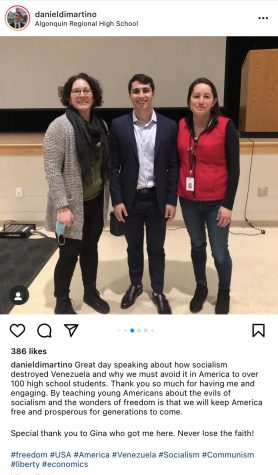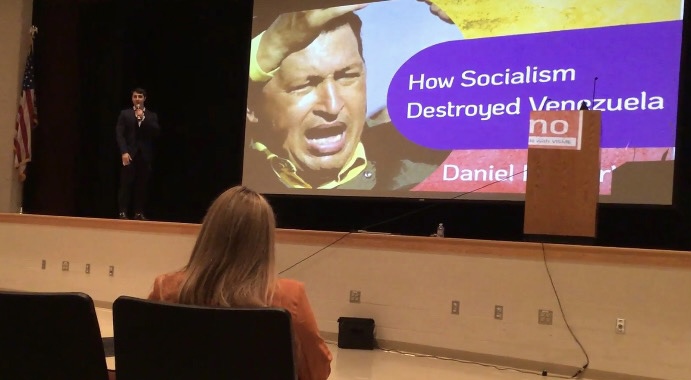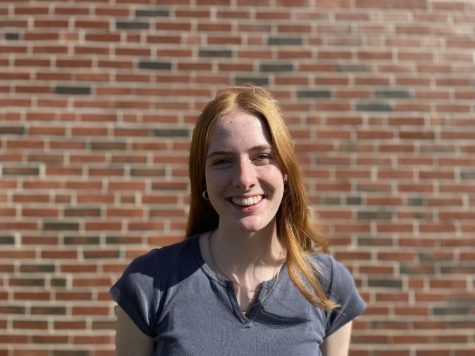Guest speaker’s message about socialism sparks controversy
Guest speaker Daniel Di Martino delivered a controversial presentation about Venezuelan socialism to ARHS students and staff on Feb. 10.
February 18, 2022
Guest speaker Daniel Di Martino visited Algonquin last Thursday, Feb. 10 to give a presentation about socialism, displaying a strong political message and setting off controversy over the presentation’s educational value.
Di Martino is a Venezuelan economist and freedom activist who gave an optional presentation to students during periods four and five. His presentation was titled “How socialism destroyed Venezuela,” and it focused on Venezuela’s economic decline, which he claims was a result of the government’s socialist policies. Using his personal experience and economic expertise, he depicted the downfall of Venezuela while also warning students about the risk of the United States “falling prey to the socialist ideology that destroyed Venezuela.”
History teacher Gina Johnston heard Di Martino speak at a Victims of Communism course she took over the summer and felt that his story was important for Algonquin students to hear.
“Hopefully, students took away from Daniel the struggles that people endure outside our borders, and that there is more to this world than our political divisions,” Johnston said.

Neither Venezuelan history nor socialism are taught in-depth in the high school curriculum, so this presentation was an eye-opening experience for many. Science teacher Maria Homberg took her Physics class to the presentation and enjoyed hearing about a new perspective.
“He was a polished speaker,” Homberg said in an email interview. “It is an inspiration to hear of people who care about people and a country going through a difficult situation.”
Senior Eddie Collins also enjoyed Di Martino’s presentation. He did not know much about socialism in Venezuela before Di Martino’s visit, but hearing his speech gave him valuable insight into the struggles that Venezuelans endure.
“Daniel is definitely an outspoken person, which is cool, and I think the overall morals of that speech have a good place in today’s society,” Collins said.
Di Martino’s presentation had strong political undertones, as he argued that socialism is an “evil ideology” that should be kept away from America. He also criticized specific American representatives who are members of the Democratic Socialists of America.
“The threat to the United States is real because of these individuals,” Di Martino said in his Feb. 10 speech. “They want to lie to Americans here and tell them that ‘No, America’s never going to become like Venezuela,’ but come on. That is an exaggeration.”
“He said that he doesn’t pretend to be something he is not,” Johnston said. “It is right on his website who he is and his belief system, which is fine. We just need to be like ‘it’s okay, he has a belief system that maybe some kids don’t agree with.’”
However, some students felt that Di Martino’s argument may have lacked the acknowledgement of viewpoints other than his own.
“I think there is value in learning about other perspectives, but I think he didn’t exactly do that because it was a little bit one-sided,” senior Jared Lipkin said. “It seemed like some of the facts he used in his presentation were cherry-picked and not really representative of a full picture. He promoted his narrative without really opening himself up to hold a dialogue.”
Collins agreed that Di Martino did not address both sides of the issue to the full extent.
“I think he was definitely more towards the anti-socialism side,” Collins said. “I don’t really remember much about seeing the other side, but I think that with students’ prior knowledge they can formulate their own takeaways.”
Principal Sean Bevan emphasizes that when a guest speaker shares their political views, it is important that students have the educational background necessary to think critically about the value of the speaker’s ideas.
“While I do think that there is ample room in a school environment to hear different perspectives than we might ordinarily hear, it’s important that students have clarity about the educational objectives of having the guest speaker visit,” Bevan said in an email interview. “For a speaker sharing a strong political message—as was this case—I would expect the teachers that brought their classes to do work ahead of the visit, so that they could think critically about his message and then implement well-structured lessons to follow up.”
In Collins’ Spanish class, they conducted research on Daniel Di Martino before he came to speak but never followed up with a discussion after the presentation.
“We were told to do some background research and come up with a few questions that we could ask him if we had the chance,” Collins said.
Depending on what class they were in for the presentation, some students did not get the opportunity to have meaningful conversations about Di Martino’s ideas before or after the presentation if it did not relate to the curriculum.
“I’m a physics teacher, so no, we did not address the topic beyond that people thought it was interesting,” Homberg said.
Many students and staff were surprised to have a guest speaker come who is openly affiliated with a political party, leading some to wonder whether or not Algonquin is the right setting for that.
“I think the general population of anywhere, but especially Algonquin, is not super knowledgeable about the intricacies of Venezuelan history, nor are we experts on the intricacies of socialism,” Lipkin said. “Because of that, a presentation by Di Martino could have been conducive to a really meaningful dialogue in higher education. At the high school level with an audience that doesn’t have the same critical thinking skills, it can come off as a little more like propaganda and just promoting views unilaterally without considering their effects.”
Johnston believes that there should be more political dialogue at Algonquin to push students and staff to recognize that there is a world beyond the Northborough-Southborough community.
“The more we talk, maybe we wouldn’t be so polarized here, but we seem to get so belief-driven that we can’t listen to the other side,” Johnston said.










